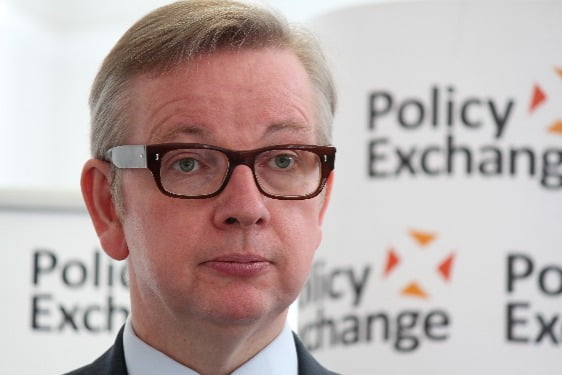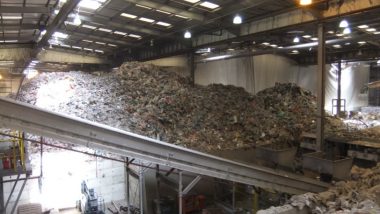Environment secretary Michael Gove announced a much needed new UK Waste Strategy in October 2017 which is designed for a number of purposes. These include encouraging clean growth, promoting the circular economy, and reducing the UK's carbon emissions.

Many organisations have subsequently welcomed the UK Waste Strategy 2017, and we have included excerpts below from a number of those supporting bodies. Any criticism which has been made has been that the promises made do not go far enough.
Scroll on down, and continue to read this page to get the bigger picture about the UK Waste Strategy as announced in October 2017.
[box type=”info” style=”rounded” border=”full”]We first reported on this subject in 2007, when the UK government (under the previous Labour Party) last issued a waste strategy. We have retained that (2007 dated) article at the bottom of the page, for historical interest.[/box]
Government waste strategy to ‘make the UK a world leader’
The announcements were made in the Clean Growth Strategy, a wide-ranging plan headed by the Department for Business, Energy and Industria
UK Environment Strategy designed to reduce the UK’s carbon emissions.
It includes a commitment to develop a resources and waste strategy “to make the UK a world leader in terms of competitiveness, resource productivity and resource efficiency”.
The cross-department strategy also said the long-awaited Defra 25-year plan would be published in 2017.
Key initiatives include:
- Targets of a 20% reduction in food and drink waste arising in the UK, a 20% reduction in the greenhouse gas intensity of food and drink consumed in the UK, and a reduction in impact associated with water use in the supply chain through delivery of the Courtauld Commitment 2025.
- Work towards no food waste entering landfill by 2030.
- Ambition for the UK to be zero avoidable waste economy by 2050.
- Increase recycling, reuse, repair and remanufacturing levels
- Extend producer responsibility schemes
- Develop resource efficiency and “industrial symbiosis” with local enterprise partnerships
- Manage emissions from landfill and research landfill gas capture
- Support anaerobic digestate used as fertiliser
The strategy also appears to put a question mark over sending waste for incineration. It said the Government would work with the waste sector to “ensure that different waste materials going into energy recovery processes are treated in the best possible way … to maximise their potential as a resource”.
Environment secretary Michael Gove said:
“Through our ambitious plans to tackle waste, better manage our precious natural resources and create a more environmentally focused agricultural system, this government is taking the lead in creating a cleaner, greener Britain.” via GovernmenttomakeUKleader
UK Clean Growth Strategy Welcomed by ADBA
We welcome the government’s ambition to divert all food waste from landfill by 2030 and to support local authorities in rolling out separate food waste collections. We look forward to BEIS’s new Resources and Waste Strategy, which will need to be supported by meaningful funding and legislation to effect the scale of change needed for an urgent transition to a more circular economy. via UK Clean Growth Strategy Welcomed by ADBA – But Food Waste Collections Needed
Northern Irish region approves UK's first ‘zero waste circular economy strategy'
Developed by Eunomia, the strategy aims to move the management of waste up the hierarchy and develop the regional economy through keeping resources and products in use for as long as possible.
The council, in partnership with Zero Waste North West, commissioned Eunomia to undertake the feasibility study to develop a strategy for the area.
Eunomia’s report predicts if recommended changes to waste management services were made, the council could save up to £3m a year and 50 additional jobs could be made.
Dominic Hogg, chairman and founder of Eunomia, the consultancy who carried out the feasibility study said: “It’s great to see local government embracing the principles of Zero Waste and the Circular Economy to provide impetus to regeneration of the regional economy. … via NorthernIrishapprovezero wastestrategy
UK Waste Strategy aims to stop needless plastic waste
Prime Minister Theresa May has pledged to eradicate all avoidable plastic waste in the UK by 2042.
The commitment is part of the government's 25-year plan to improve the natural environment.
“I think people will be shocked at how today we allow so much plastic to be produced needlessly,” the PM said.
But green groups are angry the proposals will have no legal force – and Jeremy Corbyn said 25 years was “far too long” to take action.
The Labour leader said the “throw-away” culture had to be tackled “now,” after his party described Mrs May's plans as a “cynical attempt at rebranding the Tories' image”.
Under the government's plan, supermarkets will be urged to introduce “plastic-free” aisles while taxes and charges on single-use items such as takeaway containers will be considered.
Mrs May's announcements, which have been agreed by cabinet, also include:
- Confirmation of the extension of the 5p charge for plastic carrier bags to all retailers in England
- Government funding for plastics innovation
- A commitment to help developing nations tackle pollution and reduce plastic waste, including through UK aid
In her speech, Mrs May said: “We look back in horror at some of the damage done to our environment in the past and wonder how anyone could have thought that, for example, dumping toxic chemicals into rivers was ever the right thing to do.”
She called plastic waste “one of the great environmental scourges of our time”, adding: “In the UK alone, the amount of single-use plastic wasted every year would fill 1,000 Royal Albert Halls.” … via Environment strategy to stop plastic waste
The following is our first UK Waste Strategy article, which we published soon after the announcement approximately 10 years earlier:
UK Waste Strategy 2007 Published
First Published May 2007:
The first three chapters of the UK Waste Strategy 2007 contain a number of key areas of interest including the suggestion of radical future approaches to the landfilling of biodegradable and recyclable waste.
Landfill bans
The document points to experiences on the Continent where a number of countries, such as Germany, France and Sweden, have imposed strict bans on what can be landfilled.
The strategy said that Defra wil be “consulting, subject to further analysis, on the introduction of further restrictions on the landfilling of biodegradable wastes and recyclable materials.”
Explaining the thinking behind this, the strategy says that other EU states “have found that imposing legal restrictions on the types of waste that can be landfilled has encouraged higher rates of recycling and recovery.”
The Department also noted how these have been introduced with significant lead-times, as in Germany.
Hierarchy
The strategy repeats the waste hierarchy which has five levels. These are (the best) waste prevention; reuse; recycle/compost; energy recovery; disposal (the worst/ least preferred).
The hierarchy is described as remaining as “a good general guide to the relative environmental benefits of different waste management options but that there will be exceptions to this for particular materials and in particular circumstances. The use of the waste hierarchy should be informed by life-cycle thinking and the broader sustainable consumption and production agenda.”







This is completely false we just learned about this topic in school?
This should be shown in schools. Thank you for sharing!?
Bravo?
Bravo?
By segregrating waste it helps to stimulate corporation btwn all citizens in the nations as well as contributes to sustainable improvement of recycling and solid waste mgmt.? this page speaks about recycling and waste mgmt which should be implemented as a resource mgmt system and not as waste mgmt system.